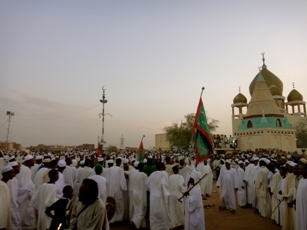Fresh calls for Shari’ah laws in Sudan amid increased sectarian tension
February 2, 2012 (KHARTOUM) – The official clerical authority in Sudan has called on the body tasked with drafting the country’s constitution to ensure full inclusion of Islamic Shari’ah law.
 On 13 July 2011, Sudan’s President Omer Al-Bashir formed a taskforce comprising legal and religious experts to draft a permanent constitution for the country after its current interim constitution, which was installed in 2005 as per the Comprehensive Peace Agreement (CPA) with South Sudan, became effectively obsolete following the expiry of that deal’s mandate in July last year.
On 13 July 2011, Sudan’s President Omer Al-Bashir formed a taskforce comprising legal and religious experts to draft a permanent constitution for the country after its current interim constitution, which was installed in 2005 as per the Comprehensive Peace Agreement (CPA) with South Sudan, became effectively obsolete following the expiry of that deal’s mandate in July last year.
The CPA paved the way for the secession of the mainly Christian South Sudan from the Muslim-ruled north, rendering the latter relatively homogeneous in terms of religion and culture.
Al-Bashir declared in several occasion that the new constitution will recognize Arabic as the official language and Islam as the only source of lawmaking.
Sudan’s [Muslim] Scholars Association (SSA), a body of state-controlled Imams and clerics, on Thursday issued a statement drawing the attention of the constitution committee to the necessity of fully implementing Shari’ah law.
The statement stressed that the reason for this is that the Sudanese people would never accept to be ruled by any set of laws other than that of Shari’ah laws.
In a related issue, the SSA urged leaders of rival religious sects to observe peaceful dialogue following the eruption this week of violent confrontation between supporters of the Ansar Al-Suna group and those of Sufi cults.
The clashes, which occurred during celebrations of Prophet Muhammad’s birthday in Sudan’s twin capital city of Omdurman, resulted in the injury of more than a dozen people.
Tension between Sufi and Salafist groups, whose views and interpretation of Islam vary in many ways, increased in the recent past.
In late 2011, a number of Sufi shrine sites in Al-Ailafon suburb, 35 km east of Khartoum, were destroyed and burned by suspected members of Ansar al-Suna.
Meanwhile, a senior member of the Islamist opposition Popular Congress Party (PCP) has accused the ruling National Congress Party (NCP) of using Salafist groups to settle accounts with rivals and cover up its political and economic failings.
While addressing a seminar held by opposition parties in Khartoum on Thursday, the PCP member Abu Bakr Abdul Raziq further described the SSA as the “scholars of the rulers” and accused the NCP of using them to negate the legitimacy of other Islamist parties.
Similarly, the lawyer and member of the opposition alliance Wagdi Salih demanded that the government launches investigations into the escalating phenomenon of issuing Fataws of apostasy against intellectual and religious figures.
Some Salafist groups recently issued Fataws pronouncing as infidel the leader of the National Umma Party Al-Sadiq al-Mahdi against the background of his opinions on the status of women in Islam.
Wagdi Salih further accused the government of allowing Salafist group to run rampant and occupy public squares.
(ST)
